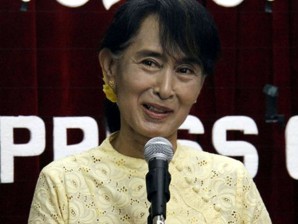Myanmar frees 20 political prisoners; more urged

Myanmar opposition leader Aung San Suu Kyi talks to journalists during a press conference at the headquarters of her National League for Democracy Party in Yangon, Myanmar Tuesday, July 3, 2012. (AP Photo/Khin Maung Win)
YANGON, Myanmar — Myanmar’s reformist government granted amnesties for at least 20 political prisoners, but opposition leader Aung San Suu Kyi called for the release of all of the hundreds more still behind bars.
Zaw Thet Htwe, who monitors prisoner releases for the opposition, said more than 20 of 46 detainees granted amnesties on Tuesday by President Thein Sein were prisoners of conscience.
The office of 88 Generation Students, a group that spearheaded a failed uprising against the military in 1988, put the number slightly higher, saying 24 political prisoners were among them.
Freedom for political prisoners is a benchmark used by Western nations critical of Myanmar’s former military regime to judge Thein Sein’s administration. Previous releases have been a major factor in decisions by those nations to ease economic and political sanctions they placed on the previous government for its poor human rights record and undemocratic rule.
Thein Sein had served with the old regime before his pro-military party won 2010 elections. In office, he began democratic reforms and opened dialogues with ethnic insurgent groups and the pro-democracy movement. Suu Kyi agreed to have her party contest by-elections in April, and she and other colleagues now belong to a small opposition in the military-dominated legislature.
Article continues after this advertisement“We will call for the release of all 330 political prisoners,” Suu Kyi, the country’s most famous former political detainee, said at a news conference Tuesday that was her first appearance since returning from a high-profile European tour over the weekend.
Article continues after this advertisementAmnesty International welcomed the releases but called on the government to set other political prisoners free.
“It is shameful that the Myanmar government continues to incarcerate hundreds of its citizens just for exercising their basic rights to freedom of expression and assembly,” the rights group said in a statement. “All prisoners of conscience must be released immediately. ”
Human Rights Watch says that prior to the latest amnesty, at least 659 political prisoners have been released over the past year. Estimates by human rights groups of the number remaining in custody range from about 200 to about 600. Suu Kyi’s party counts 330.
The state-run New Light of Myanmar newspaper reported that 37 men and nine women were being freed on humanitarian grounds “with a view to ensuring the stability of the state and making eternal peace (and) national reconciliation.”
“We are very happy that our fellow political prisoners are being released,” Ko Ko Gyi, a prominent former political detainee, told The Associated Press. “However, we will continue to work for the release of all political prisoners.”
Suu Kyi received a hero’s welcome during her European journey, but Myanmar authorities criticized her for calling her homeland Burma. The election commission, which oversees laws pertaining to political parties, said Suu Kyi should stop using the name and “respect the constitution.”
Opposition activists have long referred to the Southeast Asian nation as Burma to protest against the former army junta, which held absolute power and changed the country’s English name to Myanmar in 1989.
Suu Kyi retorted Tuesday that the junta had altered the name “without consulting any public opinion.” Suu Kyi was under house arrest at the time and said she heard the news over the radio.
“They shouldn’t have done it like that,” Suu Kyi said. “All these issues are concerned with the basic principles of democracy … and as I believe in democratic values, I think I can use whatever term I want.”
At her news conference, she called the country Burma when she spoke in English. In the official state language, the country and its people are both pronounced Myanmar.
The former junta, which ceded power last year, justified the name change on the ground that the word Myanmar better reflects the country’s ethnic diversity. The term Burma connotes Burman, the dominant ethnic group in the country, to the exclusion of ethnic minorities. But regime opponents and exile groups from a range of ethnicities — as well as foreign governments including the United States — have persisted in calling the country Burma in protest against an undemocratic regime they long saw as illegitimate.